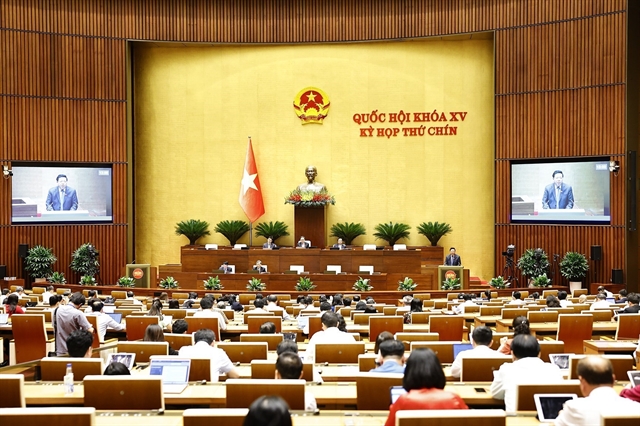 Politics & Law
Politics & Law

 |
| National Assembly deputies discuss the draft revised Railway Law on Wednesday. — VNA/VNS Photo |
HÀ NỘI — The 15th National Assembly (NA) deliberated the draft revised Railway Law at its ninth session on Wednesday, with the majority of lawmakers stressing that the law is essential to institutionalise the Party’s guidelines and the State's policies, while providing a legal foundation and driving force for the development of the railway sector.
Highlighting the transformative potential of the draft law in revitalising Việt Nam’s railway industry, Hoàng Văn Cường, a deputy of Hà Nội, expressed his support for Article 39, which empowers the Prime Minister to issue a list of railway-related goods and services to be assigned or ordered from domestic enterprises for production.
Cường stressed that to give businesses the confidence to manufacture, the domestic market must be guaranteed for these products instead of importing them from foreign markets. He suggested that the law should clearly prohibit the import of goods or components listed for domestic production.
Hoàng Minh Hiếu, a deputy from Nghệ An Province, underlined the critical importance of regulating railway infrastructure business operations as Việt Nam is modernising its railway system.
He said such provisions are essential for ensuring the transparent and efficient use of public assets, while attracting resources from both public and private sectors for infrastructure management, maintenance, and development.
Hiếu noted that while the draft law dedicates significant space to railway construction, it pays insufficient attention to railway infrastructure business and transport operations. He proposed that the drafting agency review existing regulations and draw on international legal experience to refine the bill.
Sharing insights from a recent visit to the Cát Linh–Hà Đông urban railway line, Trần Đình Gia, a deputy of Hà Tĩnh Province, advocated for adding "personal parking lots" to the definition of “technical infrastructure works for connection” under the law.
He proposed that the definition should also encompass electricity supply systems, drainage, road access to stations, transfer points between rail and road, and other relevant infrastructure. Gia also called for fare subsidies to support urban passenger rail transport.
Deputy Phạm Văn Hòa of Đồng Tháp Province voiced support for offering strong preferential policies to attract investment into the capital-intensive railway sector.
However, he cautioned against provisions allowing the Government to guarantee 100 per cent of investor credit, suggesting instead low-interest or subsidised loans as a more balanced approach.
Regarding transit-oriented development (TOD), Hòa acknowledged it as a sound policy direction but stressed the need to clearly define investor entitlements to encourage greater participation of the private sector. — VNA/VNS




